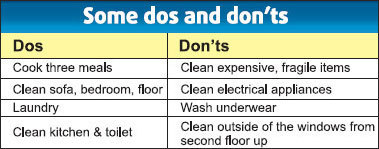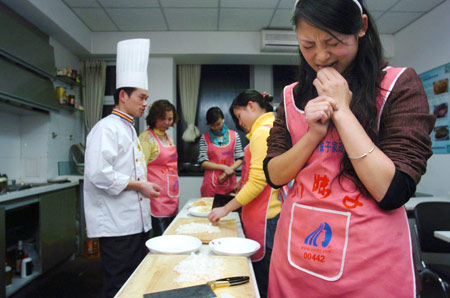Top Biz News
Maids' responsibilities made clear
By Yang Wanli (China Daily)
Updated: 2009-12-30 07:54
 |
Large Medium Small |
|
|
|
A girl holds her cut finger at a cooking class. She is trained to become a maid in Beijing, an industry with a huge demand for domestic helpers. [China Daily] |
New rules for domestic services provide detailed job descriptions
The working requirements of maids and cleaners in Beijing are for the first time being clarified with the recent release of a list of acceptable, and unacceptable, duties.
Fang Yuan is a 19-year-old housekeeper who has worked in Beijing for more than one year. Life as a maid in the city has not been easy.
"Those small agencies never consider if you are suitable for the job or not. Sometimes they deduct part of my salary and there is no way I can complain. Often I am asked to do more than my contract states," she said.
The Beijing Homemaking Service Association (BHSA) recently released its statement on the work requirements of a maid.

Among other things, the rules state that cleaners needn't wash the underwear of their employers, except for children and seniors.
"I think this will help us because we can now argue with homeowners if they ask us to perform tasks outside of our regular duties," said a cleaner surnamed Wang.
Though many maids welcome the statement, homeowners are not so happy.
"I think the rules are too specific. If I ask my maid to help me buy something if I am too busy but which isn't listed in the contract, do I need to pay her more?" said a man surnamed Zhou who hired a cleaner two months ago.
"Homemaking is different from other industries. It doesn't work well with a contractual system because it would kill the relationship between a family and their maid," said Zhou Yuanhong, founder of ColeClub, a chain store providing maid services in Beijing.
According to Li Dajing, director of BHSA, the homemaking service is like the service industry.
There are numerous disputes between employers and employees due to a lack of specific regulations and laws.
Pang Dachun, deputy director of the China Homemaking Service Association (CHSA), said the statement was just a proposal for better regulation in the industry, but shouldn't be taken as law. He added it was unlikely to be applied in force by agencies.
Zhou said the biggest problem for the industry was that most agencies were not standardized, and some functioned without the capacity to run background checks on new maids.
"We can not check their backgrounds. We have to work based on intuition," she said.
According to a consultant of shoudujiazheng.com, a website that provides information on homemaking agencies, there are more than 3,000 maid agencies in Beijing, with 176 members of BHSA. The consultant said the government has given financial support to some homemaking services centers in order to provide free training courses that include cleaning, nursing and cooking.














